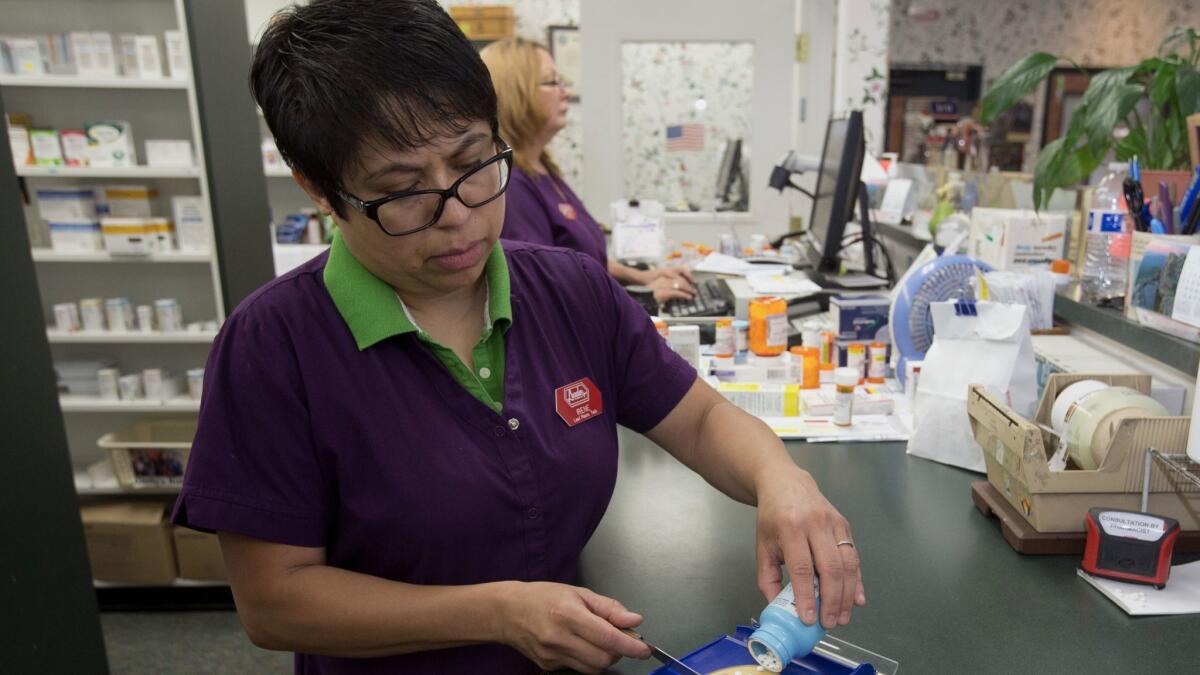Column: A legal spat between pharmaceutical companies defines what’s wrong with our drug regulations

- Share via
Lawsuits in the pharmaceutical industry are as common as TV ads promoting wonder drugs, never mind the horrific side effects relegated to a breathless, fast-talking voice over at the end.
Typically, however, the plaintiffs in these lawsuits accuse the defendants of patent infringement. (The defendants typically strike back by claiming the patents should never have been issued in the first place.)
So what to make of the lawsuit filed last week by the big drug company Allergan against the San Diego drug “compounding” company Imprimis? Allergan doesn’t accuse Imprimis of treading on any of its patents. It acknowledges that, to the extent Imprimis may be doing something wrong, its actions are governed by the Food and Drug Administration — which already has taken a handful of regulatory initiatives against the company.
They view us as a serious competitive threat. This lawsuit exists because we’re having success.
— Imprimis CEO Mark L. Baum
Instead, Allergan is trying to close off a competitive strategy that could cost it customers and money over time. The company doesn’t think the FDA is moving fast enough, so it’s taking matters into its own hands. (Allergan filed a second, almost identical lawsuit against two related Florida companies it says is behaving just like Imprimis.)
“They view us as a serious competitive threat,” Imprimis CEO Mark L. Baum told me. “This lawsuit exists because we’re having success.” Allergan declined to answer questions about the case.
Baum may be right — except that there’s reason to question whether Imprimis itself is entirely complying with the law. Baum doesn’t deny that his company is marketing drugs without obtaining FDA approval for them; he just says FDA approval isn’t necessary for its formulations.
Not everyone agrees. “If we allow companies to do what they’re doing on a large scale,” says Michael Carome, director of the Health Research Group at the consumer organization Public Citizen, “that could undermine the market for FDA-approved drugs. That would not be good public policy.”
The case underscores the ridiculous complexity of U.S. pharmaceutical regulations, which are full of loopholes and wormholes that can be routinely exploited by nimble drug companies — generally to the disadvantage of American patients. There’s little question that Imprimis is exploiting one such regulatory gap to build its business. But there’s little question that Allergan has done so itself. That’s not to mention its 2014 merger with Actavis, which transformed Allergan from an Irvine drug company into an Irish corporation in a tax-saving transaction known as an “inversion.” Actavis had been a New Jersey company until undertaking its own inversion by merging with an Irish firm in 2013.
Allergan’s lawsuit involves an exemption in drug regulations for compounding drug firms. These typically are small distributors and manufacturers that are permitted to market drugs under two circumstances. One is when a formulation including a generic drug requires a minor tweak to serve a tiny number of patients—those who can’t swallow a pill but can take a liquid, for example, or those who are allergic to a certain inactive ingredient. In those cases, physicians have to write personalized prescriptions for individual patients, covering the change. Compounding firms are permitted to make and distribute drugs in bulk, rather than individually, only when they’re declared by the FDA to be in a shortage or serving a particular clinical need.
Allergan contends that Imprimis is squeezing these exemptions until they burst at the seams. “Imprimis is simply creating, patenting, trademarking, marketing and selling standardized, mass-manufactured unapproved new drugs,” Allergan charges, “under the false guise of ‘compounding.’”
Imprimis’ chief market is for ophthalmic drugs to treat glaucoma and macular degeneration. Baum says it has boiled down the personalized variations of its drugs into three or four formulas that can meet the custom needs of millions of patients. For that, he says, “we don’t need to go through the FDA.”
Allergan says it’s merely looking out for physicians and patients. Imprimis “puts patients at risk by exposing them to drugs and combinations of drugs that have not been shown to be safe or effective,” it says in its lawsuit. But there’s a bit more to it than that. Imprimis is about to bring out a drug aimed at the market for dry-eye relief that could be a direct competitor of Allergan’s blockbuster prescription eye-drop Restasis, which treats dry eyes. With $1.5 billion in worldwide sales last year, Restasis is Allergan’s hottest product next to only Botox, which brought in $2.8 billion.
Indeed, the lawsuit claims that Imprimis is competing unfairly with Allergan by circumventing the FDA, and it seems evident that its main concern is competition with Restasis.
Nor would this be the only move Allergan has made to protect its Restasis franchise, which will run out in 2024 with its patent expiration. The day after it filed the Imprimis lawsuit, Allergan announced that it had transferred the Restasis patent to the tiny St. Regis Mohawk Indian tribe of upstate New York, which promptly transferred a license for the drug back to Allergan.
Under the deal, the tribe will get as much as $15 million a year in royalties, while Allergan will retain the rest of that $1.5 billion in income. More important, as an entity with sovereign immunity the tribe can move to quash challenges to the Restasis patent filed by the drug company Mylan and two other firms, though not a separate challenge filed by the U.S. patent office. It’s the first such maneuver known in the pharmaceutical industry, experts say, though it doesn’t appear to be illegal.
Imprimis hasn’t formally responded to the Allergan lawsuit, but the two companies have been trading slurs. Allergan in its lawsuit lists a handful of recent FDA actions against the Imprimis, including citations for unsanitary conditions at two of its manufacturing facilities. (Imprimis says it didn’t own one facility when the flaws were discovered and that other deficiencies have been resolved to the FDA’s satisfaction.) The FDA also investigated two mishaps, including one leading to a patient’s death, involving an Imprimis product; the company says physicians wrongly administered the product.
Imprimis, for its part, has dredged up, among other things, Allergan’s inversion tax maneuvers; a Federal Trade Commission allegation against Allergan and a former subsidiary that they entered a “pay-for-delay” scheme to stave off competition from a generics manufacturer against a branded drug (the case is pending); and the Indian tribe stunt.
“Allergan’s illegal, abusive, and anticompetitive actions aimed at maintaining its obscenely high drug prices,” Baum said in a news release, “reveal its true socially unconscious values.”
Keep up to date with Michael Hiltzik. Follow @hiltzikm on Twitter, see his Facebook page, or email michael.hiltzik@latimes.com.
Return to Michael Hiltzik’s blog.







